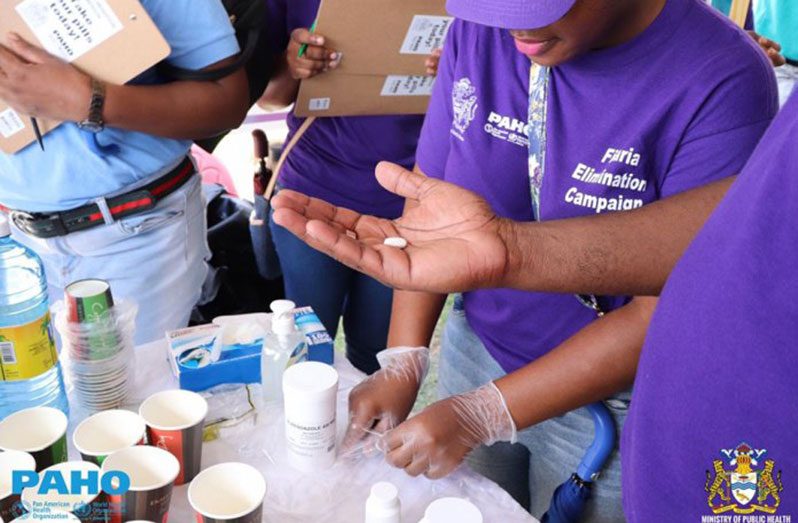RESIDENTS of Region Ten are being urged to participate in the Mass Drug Administration (MDA) campaign to eliminate filaria. The campaign, which is expected to last for two weeks, will be rolled out today and will see trained pill distributers visiting homes, offices, schools and other public places to administer pills to persons. During an interview with the Guyana Chronicle on Sunday, Regional Chairman Deron Adams called on residents to listen to the facts and dispel the myths as the campaign commences. Adams said that over the years the region has fallen short in the campaign since many are of the belief that more harm can come to them if they take the pills, when such is not the case.
“I am encouraging them to take the pills so that we can stop the dreaded disease. I know the last time we had that drive, Region Ten was lagging behind in the entire exercise, and so I am appealing to them like we do in sports and all other areas, to lead by example,” Adams said.
He added that the populace has been informed of the disease and the dreaded effects of refusing to take the pills through a number of channels. Hence, he is expecting the region to take the lead in this year’s campaign by recording the highest percentage garnered in terms of reaching the 80 per cent target. He reminded that the region lagged behind in 2019, during the first round of the campaign.
“We would have been informed about the painful and the severe visible manifestation that the disease leaves on society and so I am encouraging [residents] to take them because it can lead to permanent disability, pain and swelling of the breast, scrotum, legs and so on,” he highlighted. He added: “Those who would have been affected are not only psychically disabled but they suffer mental, social and financial loses and poverty in their community.” Adams called on residents to encourage their friends and family members to take the pills as well, since this is vital to the elimination of lymphatic filariasis in Guyana.
“So, I am encouraging residents, in the coming days, to extend a hand of corporation to the health workers, the volunteers and the other officials who would be visiting their homes, workplaces and so on in the heat to do the mass drug distribution.” Filaria, according to the World Health Organization (WHO), affects the body’s lymphatic system, which functions to remove unwanted fluids from the body and transports ‘lymph’- a fluid which contains white blood cells that help to fight infections. It is caused by bancrofti worms and is transmitted by culex mosquitoes.
Importantly, if someone is infected with filaria, they may develop chronic conditions, resulting in swelling of areas such as the legs and scrotum. Locally, the swelling of tissues in the leg is called ‘big foot,’ while scrotal swelling is termed ‘goadie.’ There is no cure for filaria, which means that these chronic manifestations are irreversible. A triple-drug regimen called IDA is being used and includes the drugs Diethylcarbamazine (DEC), Albendazole and Ivermectin.



.jpg)








